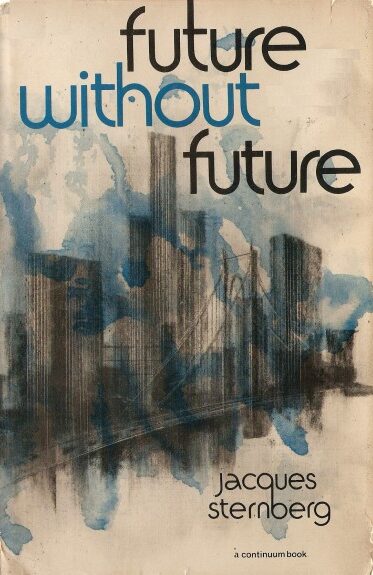 By JACQUES STERNBERG (Seabury Press; 1971/73)
By JACQUES STERNBERG (Seabury Press; 1971/73)
A rare example of an English translation (one of two) of a book by the Belgian novelist and screenwriter Jacques Sternberg. FUTURE WITHOUT FUTURE is a collection of six science fiction stories that are quite varied stylistically, but have definite thematic links, with dystopian futures, alien invasion, planet-hopping, time disruption and dark (often ironically so) codas being touchstones. The fact that the book was initially published back in 1971 is evident in the now-timeworn conceptions (which may have seemed original in their day), but Sternberg’s boundless range and imagination are timeless.
The book commences with the novella-length “Fin-de-siecle,” which takes the form of diary entries made by a resident of an alternate universe whose shadowy rulers have transformed 1950s France into a 1984-ish dystopia and manipulated the fabric of time to serve their ends. Interesting, but Sternberg doesn’t do nearly enough with a premise that seems tailor-made for the late Philip K. Dick, who would likely have given it a proper workout (as in MARTIAN TIME-SLIP and FLOW MY TEARS, THE POLICEMAN SAID).
“Very Sincerely Yours” offers a witty epistolary accounting of a book club functionary corresponding with an individual who claims to be a member, but who is eventually revealed as an emissary for an extraterrestrial race with dark designs on humanity. “The Ephemera” describes a space trip made by a man and a woman, who land on a planet upon which, among other wonders, time flows differently than it does for our Earthbound protagonists (certain details of this tale may well have found their way into Christopher Nolan’s INTERSTELLAR). “Vacation” likewise concerns an interstellar jaunt, this one made by a man who spends time on another world (whose wondrous details evidence the fact that Sternberg was a card-carrying surrealist), only to find that getting back to Earth is far more arduous than initially anticipated.
That leaves the title story, which takes the form of a historical overview of the late Twentieth Century. Predominating is the “Fatigued Generation” who came of age in the 1970s, for whom apathy and laziness are defining traits. This leads to the downfall of industrial civilization and the abolition of crime and warfare, which has the unfortunate side effect of weakening the Earth’s populace, a definite problem when an unfriendly alien race decides to invade. The parallels to our current situation, and “too lazy to live” younger generations, are undeniable, suggesting that in addition to being an uncommonly skilled wordsmith, Mr. Sternberg was something of a prophet.
